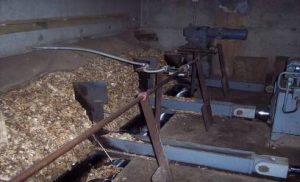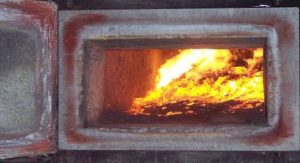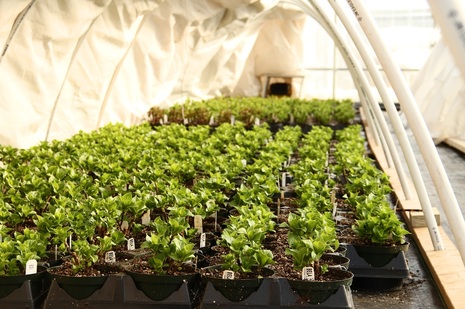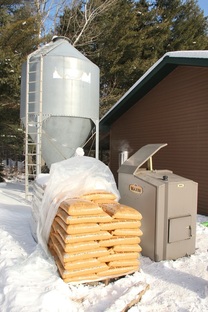Oneida Tribe of Indians of Wisconsin: Conservation Boiler Project
Fuel Type: Wood pellets
Boiler Output: 102,000 Btu per hour
Project Cost: $30,080
Amount of Assistance: $10,000 Wisconsin State Energy Program Grant
Estimated Savings: Expected savings of $1,300 per year or 33%
Purpose of Project: Installed a wood pellet boiler and necessary equipment to provide heat to two workshops.
Project Description: Energy diversification is one strategy that the Oneida Tribe of Indians of Wisconsin is trying to adopt with the intention to gain more control of their energy future. One facility on Tribal land is the Conservation Department Workshop, which uses liquid propane gas as a heat source. Reliance on fossil fuel sources introduces significant political and economic uncertainty about where the Tribe’s energy will come from. Domestic production of energy, and more importantly domestic production of renewable sources, is an important endeavor. Wood products are relatively common in Wisconsin and are a seemingly logical renewable choice. In an effort to capitalize on local energy production as well as using the resources locally, the Tribe has installed a wood pellet boiler to provide heat for the Conservation Department Workshop.
Boiler Output: 102,000 Btu per hour
Project Cost: $30,080
Amount of Assistance: $10,000 Wisconsin State Energy Program Grant
Estimated Savings: Expected savings of $1,300 per year or 33%
Purpose of Project: Installed a wood pellet boiler and necessary equipment to provide heat to two workshops.
Project Description: Energy diversification is one strategy that the Oneida Tribe of Indians of Wisconsin is trying to adopt with the intention to gain more control of their energy future. One facility on Tribal land is the Conservation Department Workshop, which uses liquid propane gas as a heat source. Reliance on fossil fuel sources introduces significant political and economic uncertainty about where the Tribe’s energy will come from. Domestic production of energy, and more importantly domestic production of renewable sources, is an important endeavor. Wood products are relatively common in Wisconsin and are a seemingly logical renewable choice. In an effort to capitalize on local energy production as well as using the resources locally, the Tribe has installed a wood pellet boiler to provide heat for the Conservation Department Workshop.
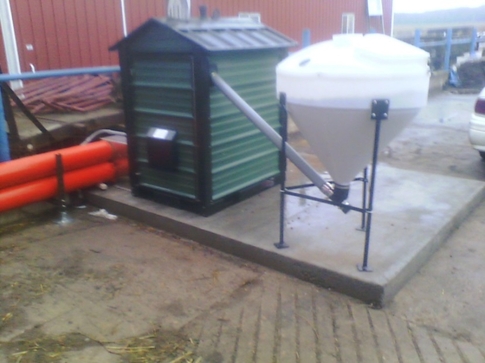
This information is courtesy of the Oneida Energy Team website.
Barron School District
Fuel Type: Wood chips
Project Cost: $55,000
Amount of Assistance: $15,000 from Focus on Energy
Estimated Savings: Offsets around 75,000 therms of natural gas (approximately $48,750)
Purpose of Project: The wood energy system provides heat for the elementary and high schools, a nearby hospital and medical center, and a nursing home.
Project Description: The Barron Area School District installed a wood boiler system in 1980 to provide steam heat for the town’s high school, elementary school, hospital and medical center, and the Maple Crofts Senior Rest Home. For fuel, the town has contracted to purchase green chipped wood from Priem Forest Products in Solon Springs, about 70 miles away. The Barron Area School District boiler has been saving the town up to 30 percent of its heating fuel costs or about $100,000 every year.
Project Cost: $55,000
Amount of Assistance: $15,000 from Focus on Energy
Estimated Savings: Offsets around 75,000 therms of natural gas (approximately $48,750)
Purpose of Project: The wood energy system provides heat for the elementary and high schools, a nearby hospital and medical center, and a nursing home.
Project Description: The Barron Area School District installed a wood boiler system in 1980 to provide steam heat for the town’s high school, elementary school, hospital and medical center, and the Maple Crofts Senior Rest Home. For fuel, the town has contracted to purchase green chipped wood from Priem Forest Products in Solon Springs, about 70 miles away. The Barron Area School District boiler has been saving the town up to 30 percent of its heating fuel costs or about $100,000 every year.
This information is courtesy of Focus on Energy.
Sunny Slope Greenhouse
Fuel Type: Wood pellets
Boiler Output: Six 55,000 Btu per hour wood boilers
Project Cost: $10,300
Amount of Assistance: $2,400 from Focus on Energy
Estimated Savings: Offsets around 5,000 therms of natural gas (approximately $3,250)
Purpose of Project: The system provides heat for 4,000 square feet of greenhouse space.
Boiler Output: Six 55,000 Btu per hour wood boilers
Project Cost: $10,300
Amount of Assistance: $2,400 from Focus on Energy
Estimated Savings: Offsets around 5,000 therms of natural gas (approximately $3,250)
Purpose of Project: The system provides heat for 4,000 square feet of greenhouse space.
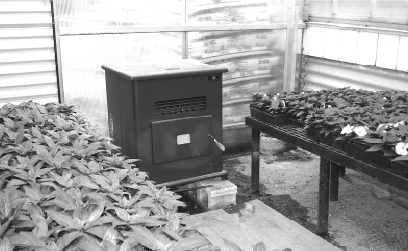
This information is courtesy of Focus on Energy.
Nine Mile Recreation Area: Wood Pellet Boiler Implementation Program
Fuel Type: Wood pellets
Project Cost: $35,000
Amount of Assistance: $20,000 Wisconsin State Energy Program Grant
Estimated Savings: $2000 per year or 40-50%
Purpose of Project: Provide space heating for the 5,500 square foot Nine Mile Ski Chalet
Project Description: The Chalet facility at the Nine Mile Recreation Area was heated by two separately located forced air LP furnaces that are over 20 years old and supplemented by an open wood fireplace. Daniel Fiorenza, Operations Superintendent, has put in a pellet boiler system to cover the entire facility’s space heating needs. Dan also believes implementing this project will provide good support of the timber management advocacy that the facility stands for. The facility also hosts many community and state events and as a result, there would be an opportunity for education and outreach to visitors of the Nine Mile Recreation Area.
Project Cost: $35,000
Amount of Assistance: $20,000 Wisconsin State Energy Program Grant
Estimated Savings: $2000 per year or 40-50%
Purpose of Project: Provide space heating for the 5,500 square foot Nine Mile Ski Chalet
Project Description: The Chalet facility at the Nine Mile Recreation Area was heated by two separately located forced air LP furnaces that are over 20 years old and supplemented by an open wood fireplace. Daniel Fiorenza, Operations Superintendent, has put in a pellet boiler system to cover the entire facility’s space heating needs. Dan also believes implementing this project will provide good support of the timber management advocacy that the facility stands for. The facility also hosts many community and state events and as a result, there would be an opportunity for education and outreach to visitors of the Nine Mile Recreation Area.
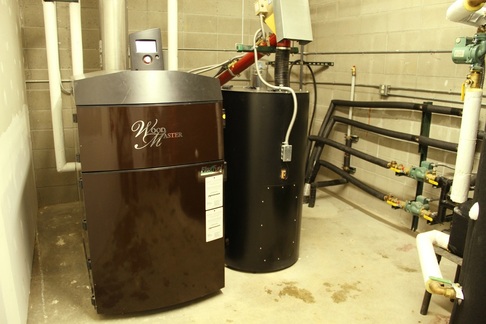
This information is courtesy of the Marathon County website and the Wisconsin State Energy Office.
Grass Creek Greenhouse LLC: Wood Pellet Boiler Implementation Program
Fuel Type: Wood pellets
Boiler Output: 250,000 Btu per hour
Project Cost: $20,050
Amount of Assistance: $20,000 Wisconsin State Energy Program Grant
Purpose of Project: Provide heating for 4,680 square feet of greenhouse space with in-floor heating for plant growth, even in winter months.
Project Description: A propane boiler has been replaced by a wood pellet-fired hydronic boiler that is housed outside the greenhouses on a poured concrete slab next to a separate building being built for servicing the equipment and boiler. A large, 8×8 foot bulk storage bin has also been installed outside of this servicing building. The wood boiler has a capacity of 250,000 BTU per hour and will consume about 35 tons of wood pellets annually. The 350-700 pounds of ash produced will be spread on nearby farm fields and incorporated into potting soil as a soil amendment keeping much of the fuel and exhaust resources local.
Boiler Output: 250,000 Btu per hour
Project Cost: $20,050
Amount of Assistance: $20,000 Wisconsin State Energy Program Grant
Purpose of Project: Provide heating for 4,680 square feet of greenhouse space with in-floor heating for plant growth, even in winter months.
Project Description: A propane boiler has been replaced by a wood pellet-fired hydronic boiler that is housed outside the greenhouses on a poured concrete slab next to a separate building being built for servicing the equipment and boiler. A large, 8×8 foot bulk storage bin has also been installed outside of this servicing building. The wood boiler has a capacity of 250,000 BTU per hour and will consume about 35 tons of wood pellets annually. The 350-700 pounds of ash produced will be spread on nearby farm fields and incorporated into potting soil as a soil amendment keeping much of the fuel and exhaust resources local.
This information is courtesy of the Grass Creek Greenhouse LLC website and the Wisconsin State Energy Office.
